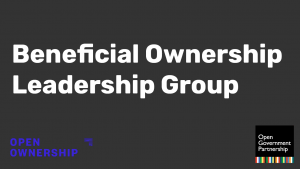Faces of Open Gov: Laima Letiņa
Laima Letiņa is Director General (Chief State Notary) to the Register of the Enterprises of the Republic of Latvia and has extensive legal expertise, particularly in registration processes and information management across public and private sectors. She has been instrumental in advancing Latvia’s anti-money laundering (AML) and counter-financing of terrorism efforts, including establishing the Ultimate Beneficial OwnershipDisclosing beneficial owners — those who ultimately control or profit from a business — is essential for combating corruption, stemming illicit financial flows, and fighting tax evasion. Technical... More register and implementing EU AML directives. She also led Latvia’s involvement in the Beneficial Ownership Leadership Group and was responsible for developing the country’s framework for beneficial ownership transparencyAccording to OGP’s Articles of Governance, transparency occurs when “government-held information (including on activities and decisions) is open, comprehensive, timely, freely available to the pub... More.
You’ve been instrumental in creating the legal grounds for Latvia’s Beneficial Ownership data, which remains open despite the Court of JusticeTo address barriers that prevent citizens from having their justice needs met, OGP participating governments are working to expand transparency, accountability, and inclusion into all systems of justi... of the European Union (CJEU) ruling in November 2022, that led many countries to close their registries. In your view, how does keeping the registry open affect businesses in Latvia, particularly smaller companies, as they navigate challenges like the EU sanctions? Can you share any concrete examples of how and for whom it’s making a difference?
Latvia’s approach to beneficial ownership transparency aligns with European Union regulations and complements the court’s reasoning. Here in Latvia, making this information public isn’t just about anti-money laundering (AML). While AML obligations are important, they only involve a limited number of people, so making information public based solely on AML rules isn’t Latvia’s way forward.
It’s important to shift our perspective on beneficial owners. These individuals are primarily businesspeople who contribute to our economy by creating jobs and driving growth and just some of them are tied to criminal activities. There’s no shame in being a beneficial owner, and they shouldn’t be unfairly stigmatized.
Public access to beneficial ownership information has a broader purpose. It fosters a transparent business environment, helping companies understand who they’re dealing with, assess risks, and build trust. This transparency also supports efforts to fight corruption by revealing who is behind legal entities that may influence public decisions.
Furthermore, beneficial ownership transparency plays a crucial role in enforcing international sanctions. When Russia invaded Ukraine, it became evident that knowing who is behind a company is essential for complying with sanctions. Transparency makes it easier for businesses, especially smaller ones, to ensure compliance without having to investigate complex corporate structures on their own.
Lastly, having this information publicly available helps businesses stay compliant with taxPlacing transparency, accountability, and participation at the center of tax policy can ensure that burdens are distributed equitably across society. Technical specifications: Commitments related to c... regulations, as they can identify potential issues related to tax schemes. In this way, transparency not only aids in preventing criminal activities but also strengthens overall regulatory compliance.
There’s a lot of talk about the upcoming changes in the EU 6th Anti-Money Laundering Directive. Could you share your thoughts on how these changes might influence transparency and open dataBy opening up data and making it sharable and reusable, governments can enable informed debate, better decision making, and the development of innovative new services. Technical specifications: Polici...? What’s most important to you in this process?
The upcoming changes in EU AML law are definitely going to affect transparency and open data. Under the new regulations, beneficial ownership data won’t be freely available as open data across the EU. Every request for this information will need to be justified and submitted to enterprise registers. This is going to create a significant administrative burden, and, honestly, I don’t think it’s justified. Such a strict approach to transparency could end up doing more harm than good.
In Latvia, transparency of beneficial ownership information isn’t just about AML. There are many other positive reasons for keeping this information open to the public. It’s essential to ask whether these justifications are still relevant and on the table. We need to strike a balance between necessary administrative procedures and ensuring that enterprise register services remain accessible, along with the information that people need.
Where do you see the future of beneficial ownership transparency?
First off, we can see that during discussions about the new AML regulations at the European Union level, privacy norms have taken a strong stance. The availability of information might be reduced from many angles, and while this makes sense from a privacy perspective, there’s concern that it could create unnecessary and disproportionate administrative burdens. For instance, when submitting certain information, the administrative work to verify it might outweigh any real privacy protection, especially if there’s no effective verification mechanism.
Even though enterprise registers might protect information at the initial stage, the wide range of people who can access this data afterward isn’t as well-governed. And realistically, we don’t have the capacity, at every level, to handle all potential data processing issues. So, even if we protect information at one point, we may not be able and also are not responsible to control what happens to it afterward.
Additionally, closing off access of beneficial ownership registers to the public and requiring justification for every information request will lead to disproportionate discussions and delays. This could slow down compliance with sanctions, which businesses need to act on quickly to keep operations running smoothly. If this process becomes too slow, it could negatively impact economic activity.
Ideally, I’d like to see beneficial ownership transparency remain open. Sure, we can discuss limiting certain data fields—maybe not all the data collected by registers needs to be public—but the basic information that helps identify people should be available. Especially during these uncertain times, it’s crucial to ensure we aren’t unknowingly supporting individuals under sanctions, like those tied to Russia.
What lessons from Latvia’s experience could be valuable for other countries considering similar reforms in beneficial ownership? How can platforms like OGP help drive progress in this area?
The work we did during the evaluation process of making beneficial ownership information public taught us a lot. It wasn’t just about making the information available—it was about understanding the limits we need to set to protect privacy. Closing off information isn’t the only way to safeguard privacy. It’s also crucial to apply the principle of data minimization, ensuring that only the information truly necessary for the public is made available.
There’s also a delicate balance to maintain between the need to access information and the need to protect privacy. For example, consider a scenario where a journalist is investigating an oligarch whose company ownership is already publicly known. Although the new directive is clear that groups with legitimate interest such as civil society and journalists can get generalized access to beneficial ownership data without alerting the legal entity, the natural person could still request to know if anyone has accessed their data as set out in GDPR. At least the category of the data recipient will have to be disclosed to the oligarch. Is it really necessary? What exactly needs to be protected and how to weigh these interests?
Since Latvia opened its beneficial ownership register, we’ve seen that the benefits outweigh the negatives. One key takeaway is how transparency fosters a better environment, boosting cooperation and trust between businesses once this information becomes public. It’s also important to strike a balance—protect those who genuinely need privacy, but keep information open to the public by default. The public must monitor this information and ensure compliance with sanctions.
OGP can drive progress by bringing us together to share good practice examples and our experiences. While challenges in Latvia might differ from those in other parts of the world, sharing both positive examples and everyday concerns helps us identify what works and what doesn’t. This collaboration, along with conducting risk assessments, allows us to refine our systems and make better decisions on transparency, ultimately improving the services we offer to the global community.
To my colleagues in other registers of beneficial owners, I’d say: Be brave. Really understand why beneficial ownership information is necessary. It’s not just about anti-money laundering or criminal investigations—it’s about boosting trust in the business environment. Once we grasp that, we can look for the best ways to collect and share this information.
No comments yet
Related Content

Anti-Corruption: Company Beneficial Ownership

Beneficial Ownership Leadership Group
The Beneficial Ownership Leadership Group came together in 2019 to drive the global policy shift towards free, open beneficial ownership data.

Open Government Challenge Areas
Learn about the ten open government areas identified by the open government community as key to strengthening democracy and improving communities.


Leave a Reply